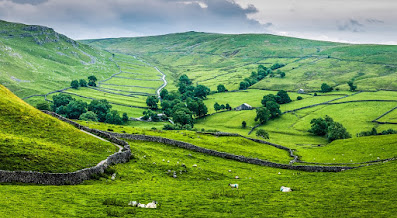In the hope of having a weekend, I wasn't going to write a long blot post this week. This really has taken over my Sundays the last few weeks. But then I started writing another monster post. About 1/3 into it, I reali{s/z}ed I'd need to explain this little thing about country and countryside. So, I've pivoted to writing this shorter thing and am ahead of the game for next week's post too. Yay.
So.
Country is a polysemous word—it has multiple meanings. And those meanings can create real ambiguities. For instance:
Lynne has lived in the country for 20 years.
That sentence is true on the 'national territory' meaning of country, but false on the 'rural area' meaning of country, since I have lived in a particular national territory (the UK) for 20 years, but I've lived in a city (Brighton) for all of those 20 years (well, technically it was a town when I moved here).
Most of the time, such ambiguities don't bother us. If Sid goes for a walk in the country, we assume the 'rural' meaning is in play; we don't feel the need to ask "Which country was it? Was it Norway?".
The word countryside serves to make it clear that we're talking about the 'rural' kind of country. It exists in both AmE and BrE, but it is used several times more in BrE than in AmE and the uses are a bit different.
 |
| the British countryside according to Fur Feather and Fin |
A straight comparison of countryside in the two Englishes is not very helpful because of the existence in the UK of the Countryside Alliance, a lobbying group that gets in the news a lot for its promotion and defen{c/s}e of "countryside activities", which include the very controversial practice of fox-hunting. Statistics for the word countryside on its own will be biased by that name.
So instead, here's a look at "[verb]ing in the countryside", which gives a clear picture that countryside is common in BrE in contexts in which it's not in AmE. (Click on images if you'd like them bigger.)
I grew up in a small town in a rural county of New York state. When we talked about where our classmates lived, we'd never have said in the countryside, we'd say out in the country. The out there is doing the same kind of work the -side in countryside can do:
When I looked at AmE uses of countryside, a lot seemed to be about tourism to other places— visiting the Italian countryside and such. It's in those kinds of contexts where AmE use of countryside starts to equal BrE use:
In a recent post about birds, I mentioned that the country(side) occupies very different place in British and American lives and self-mythologies. Countryside —in both Englishes (I think, but I could be wrong)— has the feel of a more idealized kind of place—with green hills and farmhouses, whereas out in the country for me is more neutral in terms of what the scenery is—we just used it to mean 'not within the village boundaries' (in my area of NYS, could be woods, could be farm, could an out-of-town [AmE] trailer park). The US has more types of non-urban landscape than the UK, much more wilderness, and a relatively recent history of even more (and more dangerous) wilderness. It's inevitable, really, that talking about the country(side) will bring up different connotations depending on where you're from. I haven't included an illustration for AmE 'out in the country' because the image search mostly brought up pics of small towns and highways. Looking for rural scenery, there's just too much variation to pick something 'typical' of American experience.






